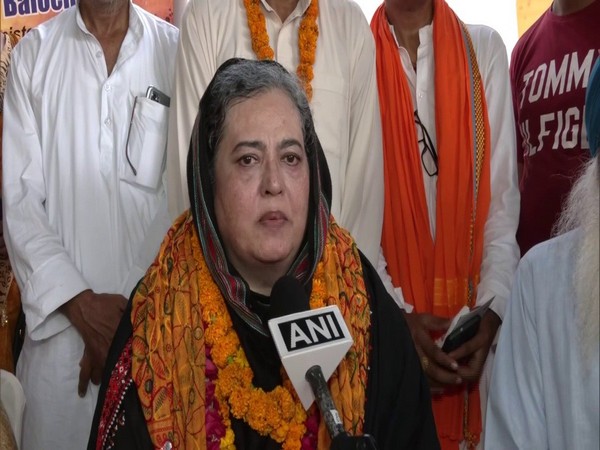A prominent Baloch rights activist and professor Naela Quadri Baloch on Saturday urged India to support Balochistan to contain Pakistan and eliminate Pakistani terrorism from South Asia.
Quadri, who is touring India seeking suport from the country, was speaking at an event here at Jantar Mantar on Saturday.
Highlighting the struggle for Baloch independence while seeking support from India, Quadri said, “There’s a civil war in Balochistan. There’s an ongoing struggle for freedom. There are little girls and boys struggling. I would urge India to join hands with Balochistan to end the hub of terrorism, called Pakistan.”
Further, speaking about the China-Pakistan economic corridor (CPEC), she said, “China-Pakistan Economic Corridor (CPEC) is a death sentence for Balochistan. It’s not an economic project, but a military one. No country has the right to sell Baloch ports. They’re displacing us from our ancestral lands to build Chinese & Pakistani settlements.”
Recently, activists in Gwadar district of Pakistan’s Balochistan province announced a large sit-in protest this week, alleging the government has failed to address their concerns regarding China’s Belt and Road infrastructure endeavours in the country.
The development in Gwadar, which is the backbone of the China-Pakistan Economic Corridor (CPEC), had decelerated during the leadership of former Prime Minister Imran Khan due to friction between the two countries, a media report said.
The protesters want the government to completely stop deep-sea trawling off Gwadar, ease up on the informal border trade that had supported livelihoods, reduce the number of checkpoints and allow fishermen to operate near the strategic port, among others and threatened that if his demands are not met then the Gwadar port would be shut down.
Notably, the acquisition of Gwadar port, the exclusion of Baloch firms and labour from Gwadar in the CPEC project have heightened pre-existing feelings of marginalisation in Balochistan, with Baloch nationalist forces either wholly rejecting the project or voicing for a greater share in these projects.
China announced the China-Pakistan Economic Corridor (CPEC) project in Pakistan in 2015, worth USD 46 billion, of which Balochistan is an integral part.
It would link Pakistan’s southern Gwadar port in Balochistan on the Arabian Sea to China’s western Xinjiang region. It also includes plans to create road, rail and oil pipeline links to improve connectivity between China and the Middle East. The Baloch have opposed China’s increasing involvement in the province.
The CPEC has not benefited the people of Balochistan while people of other provinces enjoy the fruits of the mega project. This has led to widespread protests as the Chinese are viewed as encroachers who are squeezing out all the wealth from the region.
Balochistan has long demanded independence from Pakistan, and the multi-billion-dollar China-initiated One Belt One Road (OBOR) Project has further inflamed passions. The Baloch, who are opposing the China-Pakistan Economic Corridor as part of OBOR, are facing oppression and genocide by the Pakistan Army.
Balochistan is located in the south west of Pakistan and constitutes half of the country’s territory. Demographically though it constitutes a mere 3.6 per cent of the total population of Pakistan. The province is home to over 13 million people, mostly Baloch.
Balochistan is Pakistan’s largest, but least developed province. It is one of the most important provinces of Pakistan because of the high concentration of natural resources including gas, oil, copper and gold.
However, despite the richness in natural resources, Balochistan continues to remain the poorest province of Pakistan.
There are uncounted incidents of enforced disappearances and killings of Baloch political activists, intellectuals and students by the Pakistani security forces and secret agencies.
For years, the Baloch insurgency had been regarded as a low-intensity conflict. But this is no longer the case. Innocent Baloch are killed in fake encounters and their mutilated bodies are found in remote places, according to several reports.
Enforced disappearances are used as a tool by Pakistani authorities to terrorize people who question the all-powerful army establishment of the country or seek individual or social rights. The report suggests that it is a crime that is often used by the authorities to get rid of people that are considered a “nuisance” without any arrest warrant, charge or prosecution.
The victims of these abductions, who are often youth, women, children, and elderly, are described by Amnesty International as people “who have literally disappeared.” The organisation states that the authorities grab the victims from the streets or their homes and later refuse to say where they are.
The forceful abductions are being carried out in Balochistan since the early 2000s. Students are often the most targeted section of these abductions. The victims also include several political activists, journalists, teachers, doctors, poets, and lawyers.
An annual report of the Human Rights Council of Balochistan, which is an organisation that documents human rights violations in the province, has said that students remained the main target of these kidnappings both in Balochistan as well as in other provinces of Pakistan.
The report added that tens of thousands of Baloch people have been kidnapped by the Inter-Services Intelligence (ISI) and Pakistan Army personnel in the last 20 years. Several victims have been killed and dumped and it is believed that many of them are still confined in the Pakistani torture cells.

